
Read our 2023 annual report

Knowledge Hub
A resurgence of humanity: five things we learned at Resurge2018
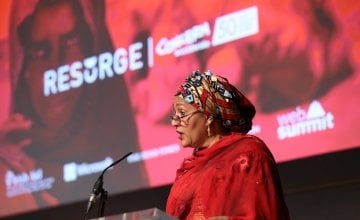
On 7 September, Concern Worldwide hosted a global conference bringing together world leaders, policymakers, and experts on conflict and the humanitarian system to find ways to break the cycle of conflict, hunger and human suffering. Here are five things we learned.
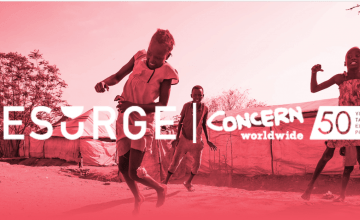
Around the world, violent conflict is increasing and is the single greatest driver of humanitarian crisis today: over 80% of humanitarian funding goes to conflict-affected contexts. In light of this, Concern has found itself working more and more in fragile and conflict-affected contexts where the needs are greatest and response is often most challenging. We are therefore exploring ways to not only respond to the needs created by conflict, but also address its underlying drivers, and ultimately prevent it.
On 7 September, Concern held a conference at Dublin Castle on the theme of A Resurgence of Humanity. The day brought together over 300 world leaders, policymakers, and experts on conflict and the humanitarian system to find ways to break the cycle of conflict, hunger and human suffering. Here are five things we learned.
1. The cycle can be broken – but first, we have to get honest
Overall, it was a day of remarkable openness about the challenges the global community faces in ending and preventing conflict, and the need to be honest about what both the obstacles we face, and the action required. Ambassador Fatima Kyari Mohammed, Permanent Observer of the African Union to the UN, summed up much of the preceding discussions by concluding that progress “starts from honesty. We have to be honest […] As soon as we start being honest in ourselves and in the work that we do, we will be able to make a lot more progress in our interventions.”
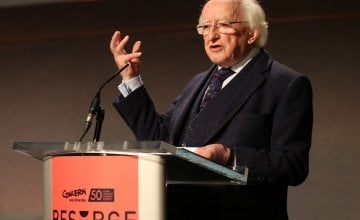
Examples of that openness and honesty abounded throughout the day. In his address, President of Ireland, Michael D. Higgins, openly called out the arms trade and decried the fact that “the five Permanent Members of the Security Council, entrusted with the maintenance of international peace and security, today account for three-quarters of the world’s arms exports. The self-defeating rhetoric of the arms race, and the immorality of the arms trade, only serve to fuel current and future wars.”
Linking this state of affairs at a global policy level to the lack of support for peacebuilding, Nobel Peace Laureate Leymah Gbowee of Liberia, concluded to loud applause, “You cannot give peanuts to peace when billions are spent on war.”
Ameerah Haq, Former UN Under-Secretary-General for the Department of Field Support, reiterated the importance of building trust, partnerships of equality, and called for an end to hypocrisy. Ms. Haq proposed that “many international donors don't practice what they preach, and that is so evident to people out there.” In a similar theme, Former President of Ireland, Mary Robinson, developed this theme further when she advised that what we need is not new international frameworks, but “much more implementation of the commitments that governments have undertaken. They voluntarily committed themselves, and they should be held to account.”
Speaking at an operational level, Jan Egeland, Secretary General of the Norwegian Refugee Council, called for a similar frankness when he challenged humanitarian organisations to make sure interventions are in the “real interest” of affected communities, and ask themselves: “Does it pass the Kivu test? That it gets better for the women there? Or does it pass the test that we feel better in concerning ourselves with it?” Concern’s own Abraham Abraham Bongassie Wanta, Country Director in the Republic of Sudan, told the audience, “We need to speak the truth,” as he lamented how donor pressures drive what he described as “hit and run programming,” – ambitious programmes that have to fit into 12 month timelines, which cannot support long-term resilience building.
The discussions closely reflected the findings of Concern’s recent report on Breaking the Cycle of Conflict, Hunger and Human Suffering, emphasising the protracted and cyclical nature of many contemporary crises. As a result, Concern has called on international donors to put an end to single-year, annual pledging conferences and deliver on existing commitments to increase flexible, multi-year humanitarian funding to address and help prevent the complex and multi-dimensional needs conflict-affected communities face.
Concern has called on international donors to put an end to single-year, annual pledging conferences and deliver on existing commitments to increase flexible, multi-year humanitarian funding.
2. Stories are powerful building blocks for peace
We also learned that stories matter: people are moved first and foremost by powerful stories that can inspire change. Professor Alex de Waal, of the World Peace Foundation, spoke about the need to “re-capture the spirit of optimism and to express that in a language that resonates. All too often the language of multilateralism is actually pretty dull – it doesn’t convince, it doesn’t move people’s emotions.” Later in the day, Director General of Irish Aid, Ruairi de Burca, shared a similar view, saying: “There’s something very powerful about hope and optimism […] If people don’t have that belief in the power of change, then it’s very hard to bring them on that journey.”
Concern’s CEO, Dominic MacSorley, closed the conference by reiterating the importance of putting the voices of conflict-affected communities, those closest to the crisis, at the very heart of our responses. This was the main motivation for Concern’s reports on voices of displacement and return, and the lived experience of conflict and food insecurity, and was a thread running through much of the day.
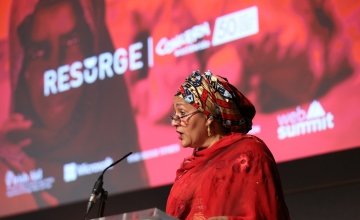
Speaking of the many millions of people affected by conflict around the world, Deputy Secretary-General of the UN, Amina Mohammed, urged the audience to remember that “they are not numbers, nor are they data, they are very much individuals in need […] They are humanity.” President Bill Clinton, echoed this sentiment in his keynote address reflecting on the transition from war to peace in Northern Ireland. Speaking about finding common humanity, and building a society based on “inclusive tribalism,” he reminded the audience: “It’s amazing what happens when people look at each other, and see another human being.”
No-one better reflected this than Concern’s Youth Ambassador, Aline Joyce Berabose, who delivered a powerful address, sharing her incredible story of survival, personal transformation and leadership. Born in a refugee camp in the Democratic Republic of Congo after her mother fled in the wake of the tragic Rwandan genocide, Ms. Berabose’s life changed dramatically when her she learned at 15 of her mother’s story of survival. Aline put aside plans to become Rwanda’s first female pilot, and dedicated her life to building peace and empowering youth across Africa. Ms. Berabose told the audience, “my mum’s story changed my perspective […] A dream is quite different to a purpose.”
In Breaking the Cycle, Concern recommends that national governments create meaningful forums for the inclusion, participation and leadership of local civil society, women and youth peace-builders in national-level peace processes, precisely so these voices and stories can play a role in building a more peaceful future.
Concern recommends that national governments create meaningful forums for the inclusion, participation and leadership of local civil society, women and youth peace-builders in national-level peace processes.
3. The war doesn’t end for women when fighting stops
Every panel of the day touched on the ways in which conflict’s impacts are fundamentally gendered. From Concern’s research on displacement in Central African Republic, hunger in South Sudan, and peacebuilding around the world, we know that women and men experience conflict differently. Women and girls are vulnerable to violence both far from the frontlines of fighting, and long after fighting stops.
Ms. Haq spoke about the long-lasting legacy of violent conflict manifesting in devastating levels of intimate partner violence in East Timor. There were also echoes of this in Colombia, where Patrick Colgan, Special Representative of the Irish Government to the Colombian Ministry for Post Conflict, reflected on the tragic circumstances in which violence against women increases after conflict, in spite of the fact that it is women who are often providing much-needed leadership in their communities.
Drawing on a consistent theme linking the experience of Ireland with the transition from conflict to peace elsewhere, President Higgins noted, “The Peace Process on our own island could not have been achieved without the steady and courageous activism of women campaigning for a more just and peaceful society.” Likewise, Ms. Gbowee called on the global community to “Add women to the peace process: it’s not about their egos; it’s not about the jobs that they want; it’s not about any political position. It’s about the communities, it’s about the common humanity and it’s about the future of their communities.” Deputy Secretary-General Mohammed also advocated for women to have “an equal voice as men, and must be involved at all levels in conflict prevention, mediation, peacemaking and peace-building.”
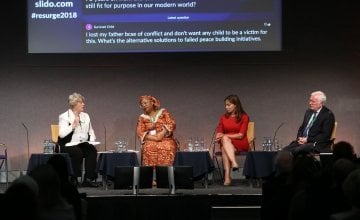
Picking up on this thread, Dr. Rim Turkmani, member of the Women’s Advisory Board to the United Nations Special Envoy to Syria, reflected on the barriers that prevent women from participation in peace processes. She drew attention to the fact that although the ambition of UN Security Council Resolution 1325 on women, peace and security is to empower women to participate in and lead peace processes at every level, the absence of formal quotas means that women remain under-represented. Dr. Turkmani’s comments echoed calls in Concern’s Breaking the Cycle report for the introduction of binding language in UN peace processes that guarantees the meaningful representation, participation and leadership of women at every level of peace-building.
Concern calls for the introduction of binding language in UN peace processes that guarantees the meaningful representation, participation and leadership of women at every level of peace-building.
4. Peace is built at the local level every day
In spite of extensive discussion of the devastating impact of violent conflict on communities, the day also highlighted the countless examples of people showing solidarity and building a brighter and more peaceful future in the most challenging circumstances. Former President Robinson spoke of her admiration for communities in Jordan who, in an act of solidarity and hospitality, welcomed in many hundreds of thousands of Syrian refugees, and told her simply: “They are our neighbours. When they are forced to leave, they are our guests.”
Drawing from his work in Northern Ireland, Mr. Colgan reflected on the multiple levels at which peace is built, and the need for locally-based partnerships that go beyond macro-level political processes, “and put [peace] in the hands of communities.” President Clinton had a similar assessment of the importance of grassroots peacebuilding, reflecting that, “The Good Friday Accord worked first because it came from the bottom up – people desperately wanted peace and demanded it. And you were lucky enough to have a system in which democracy was real and what people wanted held sway.”
Dr. Turkmani highlighted similar experiences in Syria, where the many local peace initiatives need support on the ground and an investment in mediation and local monitoring to help local peacemakers trying to broker peace. Even in the face of limited external support, Dr. Turkmani wondered at the persistence and resilience of local civil society initiatives: “It’s a miracle. I speak to Syrians every day, and they are still able to come together and achieve peace-making, peacebuilding, doing great humanitarian work, despite everything in the worst situations.” Ms. Gbowee’s reflections on the relationship between international and local organisations also touched on local peace and partnership, criticising the double standard of those in the international community who expect local civil society to act, but fail to fund them. “International donors say, we love local NGOs […] Then show them by doling out the cash.”
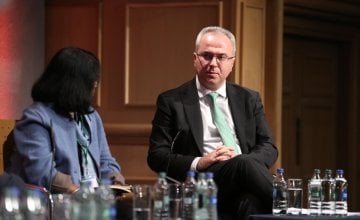
The need to build peace at the local level also means that the process of peace-making will be highly context-specific. As Sarhang Hamasaeed, Director of Middle East Programs at the US Institute of Peace reminded us, “The path to peace in Syria is different to the path to peace in Iraq, it’s different to the path in Yemen […] Even in a country, you have conflicts and sub-conflicts.” The interaction between national and local conflicts, and the stories of local peace-builders, are key themes in Concern’s series of reports on conflict and Breaking the Cycle. These, in turn, informed Concern’s call to the Irish Government to strengthen its focus on peace, conflict prevention and fragility, by tripling the funds provided to integrated programmes that include locally-led civilian peace-building, conflict prevention and resolution initiatives.
Concern calls on the Irish Government to strengthen its focus on peace, conflict prevention and fragility, by tripling the funds provided to integrated programmes that include locally-led civilian peace-building, conflict prevention and resolution initiatives.
5. Building peace takes time
A final lesson of the day was that peace takes time. President Higgins and Mr. MacSorley both reflected on the long history of humanitarianism and the struggle for human rights and social justice that the world has seen since 1968. Mr. Colgan emphasised just how long this process has been in Northern Ireland: “We're in our fourth generation of peace processes,” he remarked, “This takes an awfully long time, and we're not done yet.” Mr. Hamasaeed had a similar insight on the work of peacebuilding in the Middle East, telling the audience, “The work is not done. We need to continue. We need to have a long-term perspective on this.”
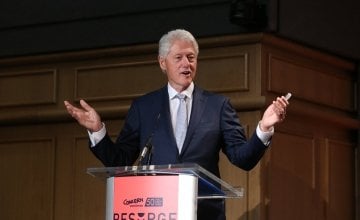
President Clinton encouraged those gathered not to be demotivated by slow progress or minor setbacks, because “There are no final victories in politics; nor are there any final defeats. The important thing is the journey, and the terms of engagement.” Reflecting on the decades’ long process of building peace in Northern Ireland, he urged leaders there to “take a deep breath, keep the agenda out there, and keep working.”
President Clinton’s words parallel the findings of Concern’s recent research, emphasising the long-lasting legacy of conflict, and the need for sustained international engagement and support for recovery. In the context of a renewed commitment to delivering 0.7 per cent of Gross National Income to development assistance, the Irish Government has an opportunity to expand Irish Aid’s Key Partner Countries to include more conflict-affected contexts, where it could play a catalytic role in supporting transformation through a long-term, whole-of-government approach.
The Irish Government has an opportunity to expand Irish Aid’s Key Partner Countries to include more conflict-affected contexts.
In its 50th year of tackling crisis in the world’s most conflict-affected contexts, Concern is committed to doing more than ever to alleviate suffering; work with communities to address the root causes of poverty and vulnerability; and empower women, men, youth, and peace champions from vulnerable groups to build a better future for their communities. We will be integrating these lessons and the insights from our recent research on conflict, displacement, hunger and peacebuilding to build better responses and continue these discussions around the world.
Find out more
Visit our Resurge2018 website for details of speaker, panels, and to read the reports issued by Concern in advance of the conference last week.


